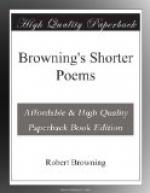Tennyson considers the chief instruments of human progress to be a vast increase of knowledge and of political organization. Browning makes that progress dependent on the production of higher passions, and aspirations,—hopes, and joys, and sorrows; Tennyson finds the evidence of the truth of the doctrine of progress in the universal presence of a self-evolving law. Browning obtains his assurance of its truth from inward presages and prophecies of the soul, from anticipations, types, and symbols of a higher greatness in store for man, which even now reside within him, a creature ever unsatisfied, ever yearning upward in thought, feeling, and endeavour.
... Hence, it is not obedience, it is not submission to the law of duty, which points out to us our true path of life, but rather infinite desire and endless aspiration. Browning’s ideal of manhood in this world always recognizes the fact that it is the ideal of a creature who never can be perfected on earth, a creature whom other and higher lives await in an endless hereafter....
The gleams of knowledge which we possess are of chief value because they “sting with hunger for full light.” The goal of knowledge, as of love, is God himself. Its most precious part is that which is least positive—those momentary intuitions of things which eye hath not seen nor ear heard. The needs of the highest parts of our humanity cannot be supplied by ascertained truth, in which we might rest, or which we might put to use for definite ends; rather by ventures of faith, which test the courage of the soul, we ascend from surmise to assurance, and so again to higher surmise.—Condensed from EDWARD DOWDEN, Studies in Literature.
... Browning has not cared for that poetic form which bestows perennial charm, or else he was incapable of it. He fails in beauty, in concentration of interest, in economy of language, in selection of the best from the common treasure of experience. In those works where he has been most indifferent, as in the Red Cotton Night-Cap Country, he has been merely whimsical and dull; in those works where the genius he possessed is most felt, as in Saul, A Toccata of Galuppi’s, Rabbi Ben Ezra, The Flight of the Duchess, The Bishop Orders his Tomb in Saint Praxed’s Church, Herve Riel, Cavalier Tunes, Time’s Revenges, and many more, he achieves beauty, or nobility, or fitness of phrase such as only a poet is capable of. It is in these last pieces and their like that his fame lies for the future. It was his lot to be strong as the thinker, the moralist, with “the accomplishment of verse,” the scholar interested to rebuild the past of experience, the teacher with an explicit dogma in an intellectual form with examples from life, the anatomist of human passions, instincts, and impulses in all their gamut, the commentator on his own age; he was weak as the artist, often unnecessarily and by choice, in the




